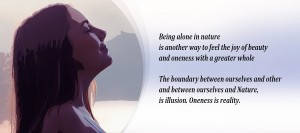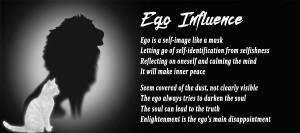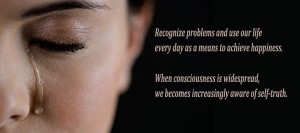The manifestation of God is present in the work of creation and it is said in the Upanishads that Knowledge, power and action are inherent; they were not worn on him from the outside. Hence his work is his freedom, and in his creation he realizes himself. The same is said: Out of joy arose all of this creation, joyfully nurtured, to joy it flourished, and into joy it entered. That is, God’s creation does not come from any need; it comes from the fullness of his joy; love that creates, therefore in creation is its own expression.
Joy separates itself from us, and then gives it shape in love’s creations to make it our more perfect possession. Therefore there must be this separation, not a separation of rejection, but a separation of love. The repulsion has only one element, the break element. But love has two, the element of disconnection which is only appearance, and the element of unity which is the ultimate truth.
Self (Jiva), as a form of God’s joy, there is no death. Because the joy is eternal amritham. Inside, we are skeptical of death. In order to reconcile this contradiction in ourselves, we come to the truth that in the dualism of death and life there is harmony. We know that the life of the soul, whose expression is finite and in principle infinite, must pass through the death portal of the body on its way to realizing the infinite.
In its limited aspect, the self is aware of its separation, and there it is cruel in trying to have more differences than any other. But in its infinite aspect, the desire is for harmony which leads to its perfection and not just its increase.
The emancipation of our physical nature is achieving health, our social existence in achieving goodness, and ourselves in achieving love. The latter is what is described as extinction – the extinction of selfishness – which is a function of love, and which does not lead to darkness but leads to enlightenment. This is true enlightenment; is our inner expression of joy boundless by the light of love.
So in our freedom of desire, we have the same dualism of appearance and truth – our selfish desires are simply the appearance of freedom and love is truth. When we try to make this appearance apart from the truth, then our efforts bring misery and in the end prove their own futility. All have the dualism of māyā and satyam, appearance and truth.
Words are māyā where they are only sound and finite, they are satyam where they are thought and infinite. The self is māyā in which it is only individual and finite, where it regards its separation as absolute; it is satyam in which he recognizes his essence in the universe and is infinite, in the highest self, in the paramātman.
Then there is mukti, his release from the vortex of māyā, visions arising out of avidya or ignorance; emancipation in çāntam çivam advaitam, in perfect serenity in truth, in perfect activity in goodness, and in perfect union in love.
As the boundaries of natural law are separated from God, so are the boundaries of his selfishness which separate from him. It is like a father giving his son an inheritance within the limits of which he is free to do as he pleases. Even though it remained part of his father’s possessions, he released him from the operation of his own accord.
So the love of God from which we are formed makes it separate from God; and it is God’s love that once again establishes reconciliation and unites God with us through separation. That’s why we have to go through endless reincarnation and renewal.
Separation is a limitation in which it finds a barrier to return again and again to its infinite source. Our selves incessantly let go of their limits in forgetfulness and death, to manifest the eternal.
Our life, like a river, crashes into its banks not to find itself covered by it, but to recollect every moment that it has endless openings toward the sea. The boundary wall of our individuality pushes us back within our limits, on the one hand, and thus guides us, on the other to the infinite. Only when we try to make these boundaries infinite are we launched into the impossible contradictions of grievous failure.
This is the end of us seeking that unity. We must bow our heads in love and tenderness and take a stand in place so that all can meet as one unit in the One.





